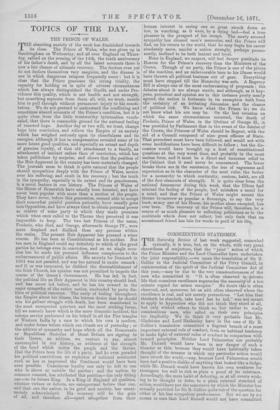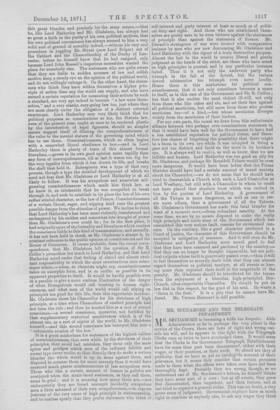CONSCIENTIOUS STATESMEN.
THE Saturday Review of last week suggested, somewhat. cynically, it is true, but, on the whole, with very great shrewdness of conjecture, that the " joint " action of which the Prime Minister and the Lord Chancellor have undertaken the joint responsibility,—we mean the translation of Sir R.. Collier to the Judicial Committee of the Privy Council, in contravention of the spirit of the Judicial Committee Act of this year,—may be due to the very conscientiousness of the men who committed it. " It is often observed in private life that conscious excellence supersedes the necessity of a too, minute regard for minor scruples." No doubt this is often observed, and, moreover, let us add, often observed whore the excellence is real, and not merely pretentious. "Lot him that thinketh be standeth, take heed lest he fall," was not meant. to apply to hypocrites who did not think they stood at all, but only wished others to think so, but rather to really conscientious men, who relied on their own principles too implicitly. We do think it very probable that Mr. Gladstone and Lord Hatherley have in the case of Sir R. Collier's translation committed a flagrant breach of a most important external rule of conduct, from an habitual tendency to make light of external rules of conduct in comparison with inward principles. Neither Lord Palmerston nor probably Mr. Disraeli would have been in any danger of such a blunder as this, because they would have habitually taken thought of the manner in which any particular action would have struck the world,—nay, because Lord Palmerston would have had a positive dislike of anything that looked like a dodge, while Mr. Disraeli would have known his own weakness for stratagem too well to risk so plain a proof of its existence. Accordingly, the mere habit of deferring, or at all events wish- ing to be thought to defer, to a plain external standard of action, would have put the manoeuvre by which the Minister has actually provided for Sir R. Collier quite out of the question for either of his loss scrupulous predecessors. But wo are by no means so sure that Lord Russell would not have committed
this great blunder, and precisely for the same reason,—that he, like Lord Hatherley and Mr. Gladstone, has always had so great a faith in the purity of his own political motives, that his own political convenience has always seemed to him a very solid sort of ground of morality indeed,—witness his very cool procedure in juggling Mr. Strutt (now Lord Belper) out of the Cabinet and the Chancellorship of the Duchy of Lan- caster, before he himself knew that he had resigned, only because Lord John Russell's imperious necessities wanted the place for somebody else. The statesmen who are quite aware that they are liable to sudden accesses of low and selfish motive, keep a steady eye on the opinion of the political world, and do not willingly outrage it. On the other hand, the states- men who think they have within themselves a higher prin- ciple of action than any the world can supply, and who have earned a certain reputation for measuring their actions by such a standard, are very apt indeed to become " a law unto them- selves," and a very elastic, easy-going law too, just where they are most clearly under the obligation of a distinct external enactment. Lord Hatherley may very likely think that for political purposes so conscientious as his, the Statute law, even of the present year, ought at once to be rendered plastic by the introduction of legal figments, should no simpler means suggest itself of dilating the comprehensiveness of the rules to the mental stature of the governing mind which has to use them. Conscientiousness, which so often begins with a somewhat literal obedience to law,—and in Lord Hatherley there is plenty of trace of this almost formal literalism,—grows in its own good opinion more rapidly than any form of unscrupulousness, till at last it waxes too big for the very legality from which it has drawn its life, and breaks tho shell that held it. Robespierre was a typo of that very process, though a type the detailed development of which wo need not fear that Mr. Gladstone or Lord Hatherley is at all likely to follow. It was his scrupulous and somewhat self- gnawing conscientiousness which made him think law, as he knew it, so intolerable that he was compelled to break through it, and seek to establish in its place the law of his own rather stinted character, as the law of Prance. Conscientiousness of a certain literal, eager, and nipping kind runs the greatest possible danger from the stimulus of power. We incline to think that Lord Hatherley's has been more violently transformed and endangered by his sudden and somewhat late draught of power than Mr. Gladstone's ever could be ; for in the first place, it had originally more of the formality and literalness which renders the conscience liable to this kind of transmutation; and secondly, it has not been held in check, as Mr. Gladstone's always is, by constant reference to the public opinion of constituencies and the House of Commons. It seems probable, from the recent corre- spondence, that Mr. Gladstone left the question of Sir R. Collier's promotion too much to Lord Hatherley, and that Lord Hatherley acted under that feeling of elated and almost exul- tant responsibility to which the most conscientious men some- times attain,—when, as chemists might say, conscientiousness takes an amorphic form, and is as unlike as possible in its apparent properties to itself. It would be hardly possible oven in a parable to give a more curious illustration of the danger of what Evangelicals would call trusting to human right- eousness, and what men of the world would call relying on principles too good for this life, than this regrettable incident. Mr. Gladstone chose his Chancellor for his strictness of high principle, at a time when Chancellors of exalted principle had not been the rule ; and then he trusted him as a sort of second conscience,—a second conscience, moreover, not fortified by that supplementary oratorical sensitiveness which is of the Utmost use, as a sort of mirror of the world, to Mr. Gladstone himself,—and this second conscience has betrayed him into a " colourable evasion of the law."
It is a great misfortune for statesmen of the highest calibre of conscientiousness, that even while, by the strictness of their principles, they avoid bad mistakes, they incur only the more spites and grudges which men of the ordinary fallible and errant typo never excite, so that directly they do make a serious blunder the whole world is up in arms against them, and disposed to censure them far more severely than it would have censured much graver misdemeanours of less scrupulous men. Those who like a certain amount of licence in politics are overjoyed when the strait-laced statesmen, as they call them, conic to grief ; and it is amazing how many there are,—not unfrequently they are found amongst decidedly scrupulous' men a little ashamed of their own scrupulousness,—to express jealousy of the very name of high principle in statesmanship, and to confess openly that they prefer statesmen who think of self-interest and party interest at least as much as of politi- cal duty and right. And those who are strait-laced them- selves are pretty sure to be even bitterer against the statesmen of principle than against the statesmen of licence. Mr. Disraeli's stratagems of war were treated with comparative lenience by men who are now denouncing Mr. Gladstone and Lord Hatherley with the rigour of a truly destructive purpose. Almost the last in the world to receive liberal and gentle judgment at the hands of the strict, are those who have acted on high principles in general, and in any particular instance failed. Thus it is not only the undevout party who triumph in the fall of the devout, but the various devout schismatics too triumph even more loudly. Hence there is this misfortune for political con- scientiousness, that it not only sometimes becomes a snare to itself, as in this case of the Government and Sir R. Collier ; but that it also excites the most violent ill-will, not only from those who like cakes and ale, and set their face against all political asceticism, but still more from those who profess asceticism too—of a kind,—but whose asceticism diverges widely from the asceticism of their leaders.
For our own parts, the moral we draw from this unfortunate alliance between two perhaps over-conscientious statesmen is, that it would have been well for the Government to have had a less established reputation for political virtue, and there- fore less chance of forgetting the possibility that there might be a beam in its own eye while it was occupied in fixing a gaze not too distinct and lucid on the mote in its brother's eye. It is always well to realize, as well as know, that we are fallible and human. Lord Hatherley was too good an ally for Mr. Gladstone, and perhaps Sir Roundell Palmer would be oven more dangerous. It would have been better that the Prime Minister should have had a certain amount of moral anxiety about his Chancellor,—we do not mean that he should have tried to disestablish a Church with such a Lord Chancellor as Lord Westbury, but still with a Chancellor in whom he could not have placed that absolute trust which was excited in him by the purism of Lord Hatherley. A government of all the Virtues is more dangerous, as well as one to cre- ate more odium, than a government of all the Talents. Mr. Gladstone's Government has made this fatal blunder for want of a memento mori,—from redundant sanctity. At the same time, we are by no means disposed to make the really high principle and noble aims of the Government which has committed this very serious fault, reasons for envenomed cen- sure. On the contrary, like a good character produced in a Court of justice, the character of this Government should be accepted in mitigation of sentence. And it will even do Mr. Gladstone and Lord Hatherley more moral good to feel that they have been censured and pardoned by the country, that they can no longer be thought impeccable, but are poli- tical culprits whose fault is generously passed over,—than it will to feel themselves so severely dealt with that they can almost regard themselves as political martyrs, at all events as hav- ing more than expiated their fault in the magnitude of the penalty. Mr. Gladstone should be interdicted for the future from the enjoyment of a literalist, high-principled, Dry- Church, ultra-respectable Chancellor. He should be put on low diet in this respect, for the good of his soul. He wants a " thorn in the flesh." It is a pity that he cannot have Mr.
Jesse'. Mr. Vernon Harcourt is still possible.











































 Previous page
Previous page